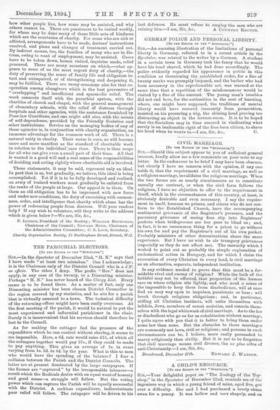CIVIL MARRIAGE.
[To THE EDITOR 07 TER " SPECTATOR:1 SIR,—S110111d this subject appear to you of sufficient general interest, kindly allow me a few comments on your note to my letter. In the endeavour to be brief I may have been obscure, but clearly I have no concern with the opinion, if any one holds it, that the requirement of a civil marriage, as well as a religious marriage, invalidates the religious marriage. When the two forms are so nearly simultaneous as to constitute morally one contract, or when the civil form follows the religious, I have no objection to offer to the requirement in itself, which in the circumstances of this country, at least, is obviously desirable and even necessary. I say the require- ment in itself, because we priests, and others who do not con- form to the Established Church, have the accompanying sentimental grievance of the Registrar's presence, and the pecuniary grievance of seeing fees slip into Registrars' pockets when bridegrooms are too poor to blind us ; and, in fact, it is no uncommon thing for a priest to go without his own fee and pay the Registrar's out of his own pocket. Probably ministers of other denominations share the same experience. But I have no wish to air trumpery grievances (especially as they do not affect me). The enormity which I wished to point out as probably the simple explanation of ecclesiastical action in Hungary, and for which I claim the execration of every Christian in every land, is civil marriage as an alternative, separate, independent institution.
Is any evidence needed to prove that this must be a for- midable rival and enemy of religion ? While the bulk of the faithful may not be affected, that proportion of the human race on whom religion sits lightly, and who need a sense of the impossible to keep them from disobedience, will at once find an easy way open to impulses, passionate or base ; will break through religious obligations ; and, in particular, stifling all Christian instincts, will unite themselves with infidels, Jews, members of secret societies, and console them- selves with the legal whitewash of civil marriage. As to the lax or disobedient who go as far as cohabitation without marriage, I quite agree with you that it is better to bring them under some law than none. But the obstacles to these marriages arc commonly not laws, civil or religious ; and persons in such circumstances can be, I believe, more easily persuaded to marry religiously than civilly. But it is not to be forgotten that civil marriage means civil divorce, the ne plus ultra of anti-Ohristianity.—I am, Sir, &a.,


































 Previous page
Previous page